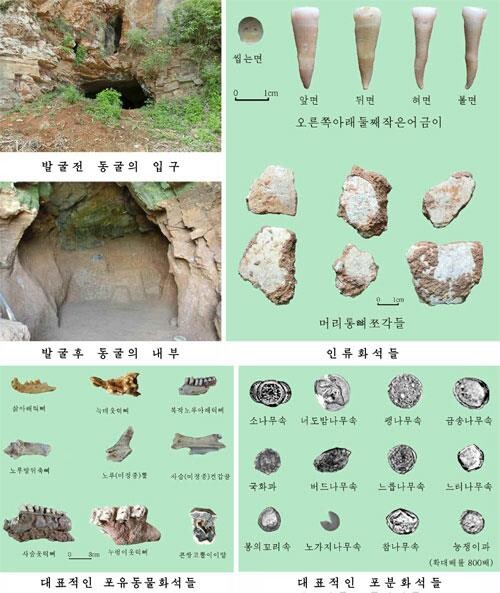 |
| ▲ This photo, shows the fossils found in the Paleolithic Cave located in Gangdong District, Pyongyang, North Korea. The Rodong Sinmun, North Korean newspaper that serves as the official newspaper of the Central Committee of the Workers' Party of Korea, reported on the 11th that a human fossil estimated to be more than 20,000 years old was found in a Paleolithic cave in Imgyeong-nodong-jagu, Gangdong county. (PHOTO NOT FOR SALE) (Yonhap) |
SEOUL, May 11 (Yonhap) -- North Korea has claimed that human fossils of around 20,000 years-old has been found in an Paleolithic cave located in Gangdong county, Pyongyang.
According to the Korean Central News Agency on the 11th, the research team of the Department of History at Kim Il-sung University recently discovered 7 human fossils, 300 of 9 types of animal bone fossils, and 274 fossilized fossils in the second-floor cultural layer while exploring a Paleolithic cave in Imgyeong-nodong-jagu, Gangdong county.
A cultural layer is a layer of earth on sites of human habitation containing traces or remains of man's activities.
When the research team dated the fossils, they were analyzed to be between 20,000 and 26,000 years old.
The human fossils found, which were fragments of teeth and skulls were believed to be a woman in her 30s who lived in the Paleolithic stone age.
The North Korean Archaeological Society has decided to name the human fossils discovered as "Gangdong People."
The Imgyeong Cave was registered as a preservation site with the decision of the Non-Permanent Material Heritage Review and Evaluation Committee, along with the state council.
"The early stage of 'Gangdong people' were discovered for the first time in the Gangdong area of Pyongyang, where Dangun, the original ancestor of our nation, is buried," said Korean Central News Agency. "It has great significance in anthropology as it clears the fact that the area had a long history and was also a place where the culture has first started."
North Korea has claimed that Pyongyang was the center of the Korean Peninsula's history by announcing that it had found the human bones of Dangun (Dangun or Dangun Wanggeom was the legendary founder and god-king of Gojoseon, the first Korean kingdom) and his wife in a tomb in Daebaksan Mountain, Gangdong county, Pyongyang in 1993.
However, South Korean academics has raised doubts as to the authenticity of the tomb of Dangun, claiming that the tomb portrays a Goguryeo style, instead of following the Gojoseon style.
(This article is translated from Korean to English by Haemin Kim.)
(END)
(C) Yonhap News Agency. All Rights Reserved





















![[박스오피스] '만약에 우리' 200만 돌파…3주째 주말 1위](https://korean-vibe.com/news/data/20260126/yna1065624915992608_675.jpg)

![[테크스냅] 티빙, 국내 TV 드라마 일본·아태 17개 지역 공개](https://korean-vibe.com/news/data/20260126/yna1065624915992582_728_thum.jpg)